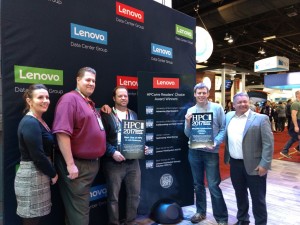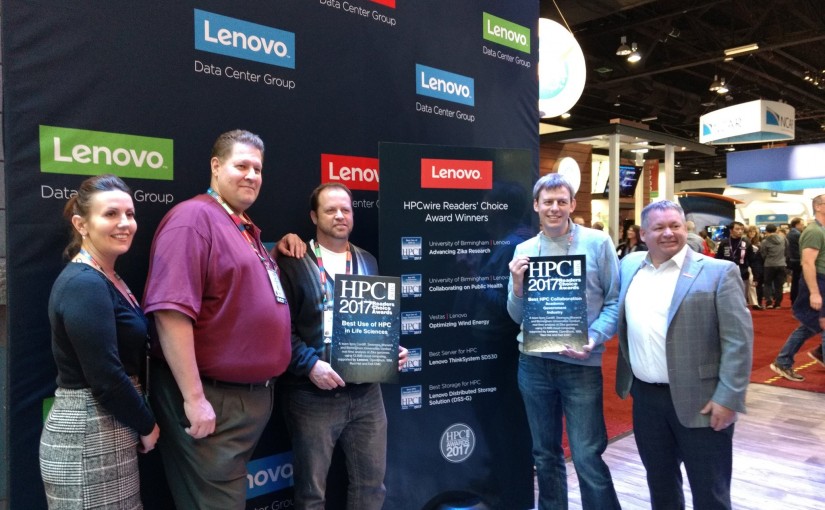The MRC-funded Cloud Infrastructure for Microbial Bioinformatics (CLIMB) has been recognized in the annual HPCwire Readers’ and Editors’ Choice Awards, presented at the 2017 International Conference for High Performance Computing, Networking, Storage and Analysis, in Denver, Colorado.

CLIMB was awarded the following honours:
“Best Use of HPC in Life Sciences” for Real-Time analysis of Zika genomes, supported by Lenovo, OpenStack, IBM, Red Hat and Dell EMC.
“Best HPC Collaboration (Academia/Government/Industry)” for CLIMB drawing on Lenovo, OpenStack, IBM Spectrum Scale, Red Hat, and DELL EMC to provide resources for projects that globally impact public health.
CLIMB is a UK-based cloud-computing project funded by the UK’s Medical Research Council and available to all UK-based microbiologists, providing them with a powerful computational environment to store, analyse and reuse data. CLIMB help the UK microbial research community to analyse the vast amounts of data generated by next generation sequencing. Many academics don’t have the resources needed to perform microbial bioinformatics analysis to interpret this data: CLIMB overcomes this bottleneck. Currently, it supports over 200 research groups from across academia, government agencies and health services. The CLIMB project also encompasses refurbished bioinformatics space, training courses and three research fellowships.
Professor Mark Pallen, Research Leader at the Quadram Institute in Norwich and Principal Investigator on the CLIMB project said, “It’s great that our CLIMB consortium has been recognised for the contributions we are making to tackling global health problems. I have to thank our great team for their fantastic efforts in maintaining this remarkable resource.”
The HPCwire Readers’ and Editors’ Choice Awards recognise the pioneering use of the CLIMB infrastructure to analyse viral genome sequences during the 2016 Zika virus epidemic. Professor Nick Loman, a CLIMB Fellow at the University of Birmingham, said: “When Zika was declared a Public Health Emergency of International Concern in early 2016, there was an urgent need to work out how long it had been circulating in the Americas so epidemiologists could interpret the link to microcephaly in newborns. To address this problem, working with Brazilian collaborators, we deployed portable sequencing in a mobile laboratory that toured Northeast Brazil. To generate results quickly, we needed fast, flexible access to very large computational and storage resources. Fortunately, CLIMB met this need, so we could very rapidly release results that helped guide the public health response to the epidemic”. Loman’s use of mobile field labs and cloud-computing resources builds on previous work during the Ebola epidemic in 2015
Dr Thomas Connor, a Senior Lecturer at the University of Cardiff and, with Loman, technical architect of CLIMB said “By bringing together a truly nationwide consortium of research organisations to provide a federated research environment, we have been able to put the key tools for computational biology research and collaboration directly into the hands of researchers, regardless of their home institution”.
The coveted annual HPCwire Readers’ and Editors’ Choice Awards are a mark of the esteem that CLIMB has earned in recent years across the wider HPC community. These awards are determined through a nomination and voting process involving the global HPCwire community, as well as selections from the HPCwire editors. The awards are an annual feature of the publication and constitute prestigious recognition from the HPC community. These awards are revealed each year to kick off the annual supercomputing conference, which showcases high performance computing, networking, storage and data analysis.
“From innovative industry leaders to the end consumer, the HPCwire readership reaches and engages every aspect of the high-performance computing community,” said Tom Tabor, CEO of Tabor Communications, publisher of HPCwire. “There is undeniable community support signified in receiving this award. Not only from the entire HPC space, but also the amplitude of industries it serves. We proudly recognize these efforts and achievements and gladly allow the voices of our readers to be heard. Our sincere congratulations to all of the winners.”
More information on these awards can be found at the HPCwire website (http://www.HPCwire.com) or on Twitter through the following hashtag: #HPCwireAwards.
About HPCwire
HPCwire is the #1 news and information resource covering the fastest computers in the world and the people who run them. Dating back to 1986, HPCwire enjoys a legacy of world-class editorial and journalism, making it the news source of choice for science, technology and business professionals interested in high performance and data-intensive computing.
About MRC CLIMB
CLIMB began life in 2014 and was one of the first multi-site OpenStack deployments in the UK dedicated to supporting the needs of research computing. To date, CLIMB remains the only truly federated academic research cloud operating in the UK. The current live system is located across the Universities of Birmingham, Cardiff and Warwick. A fourth node, based at Swansea, is due for launch in late 2017. Since building the CLIMB cloud, the CLIMB research partnership has expanded to include the Universities of Bath and Leicester, as well as the Quadram Institute.
Through CLIMB, microbiologists can access hundreds of CPUs, thousands of gigabytes of RAM and tens of terabytes of storage dedicated to their research. The CLIMB infrastructure runs OpenStack and is made up of Lenovo SystemX servers with 512GB–3TB of RAM and up to 240 cores, enabling researchers to request huge amounts of computing resource on the fly. Storage is provided by IBM StorWise with IBM Spectrum Scale and Red Hat Ceph running on Dell servers.
As a national resource. providing large-scale data storage and computing capacity on demand, CLIMB achieves efficiency of scale, reducing costs to the public purse by optimising use of hardware.


